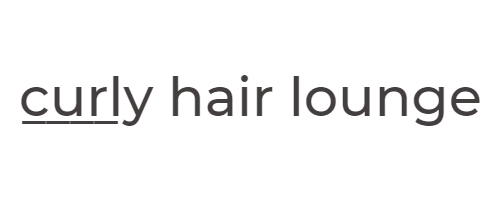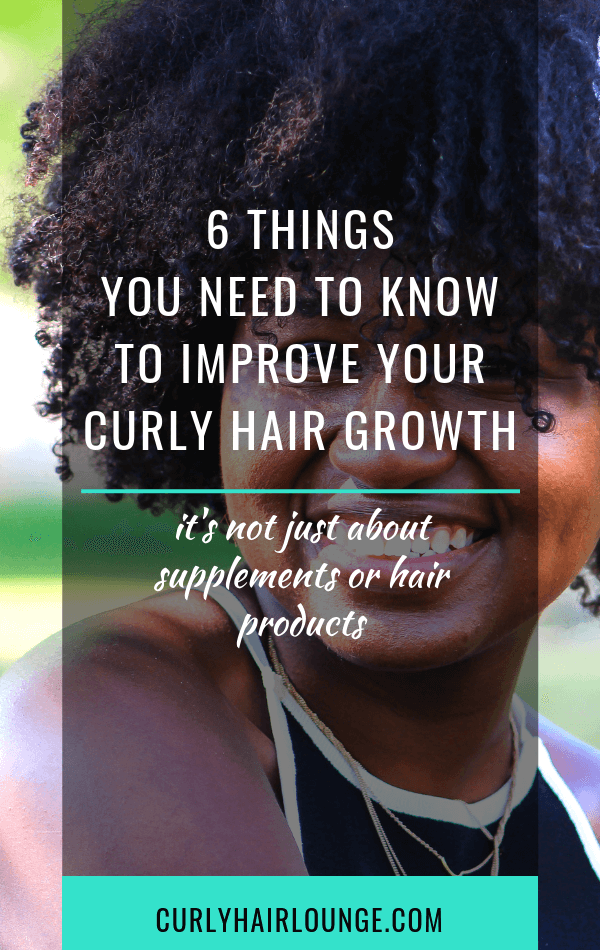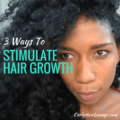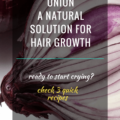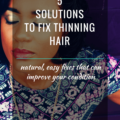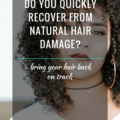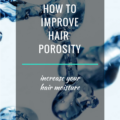Hair growth is on the list of most, if not all, curly hair newbies, right up there with hair moisture. Every other email I get is specifically about it or somewhat related to it. I get that once the decision to go natural is made we want to take the fast route to our destination – natural hair. However, there are many things that affect hair growth that you need to know about so you can improve your curly hair growth.
I remember back when I was transitioning and I got a glimpse of my first measurable curls (yes! Not the first and second coils of my curly hair but a good one to two inches of new hair growth) and I was hooked!
They were strong, shiny, full, thicker… Yes, it was love at first sight! <3 They looked and felt so different from my relaxed hair, so much more healthy that I wished it was possible to snap my fingers and fast forward my proposed 2-year transitioning hair journey.
Can you relate to this?? This may also be your wish whether you’re starting out or way in your hair journey.
With this in mind, it’s easy to fall back into the easy route and search for all sorts of things that will increase hair growth – oil mixes, supplements, head massages and more. However, as said previously on another post, these are only temporary solutions. It’s not something you can fine tune to your liking (how great would that be 😉 ).
In reality, once you stop those practices you’ll return to your normal hair growth rate. You’d need to continue those practices to keep seeing the same results.
I don’t know about you, but I hate taking pills and because hair growth was never a concern to me I can’t be bothered with head massages and the like. Besides, I know many of you don’t want to add more steps to your hair routine and others are already keeping a daily fight with your ‘lazy persona’, so let’s get a little understanding of how hair growth works before you start wasting time on unnecessary practices.
Hair Growth 1-On-1
The first thing you’ve got to understand about hair and its growth is that all hair grows and dies and it does so through a cycle – Hair Growth Cycle – that can last between 3 to 5 years.
In this cycle, there are three different stages: the Anagen, the Catagen and the Telogen. Though a few more stages seem to have been added to the cycle, these are the main ones.
The Anagen is the stage where your hair is growing, the Catagen is when your hair is preparing to collapse, it’s kind of in a resting stage and finally, you have the Telogen stage which is when your hair sheds. Your old hair starts falling out and the newer ones start growing.
All this happens in a 3 to 5-year span and your specific hair cycle can last anything between this period. So if your cycle lasts 3 years, multiply the average annual hair growth rate (6 inches) by 3 and that’s what your maximum hair growth is (6X3=18) during that period.
If you’re on a 5 -year cycle, with proper care, your hair will grow up to 30 inches in that period. This cycle is something you can not change because it’s predetermined, it’s genetic!
You can, however, stimulate it and this, yes(! ) will accelerate whatever cycle your hair is on (notice not all hair on your scalp is on the same stage). But to give a better picture of what affects your curly hair growth here is a list.
#1| Vitamins
Biotin is probably the first thing that comes to mind when thinking about taking supplements for hair care. It’s a water soluble vitamin that strengthens your hair by helping to produce keratin and it also increases your hair’s elasticity.
If your hair is brittle and thinning down, biotin can help revert all this and increase your hair growth rate. It also has the ability to improve your skin and nails’ condition.
These effects will only last for however long you take the supplements and they have some side effects you may not want to sign up for like a really bad case of acne or bright yellow urine. The side effects vary from person to person and this happens because your body is flushing out the excess amount of biotin you’re taking (sometimes 2000% above your daily dosage needs).
So… vitamins supplements can work, but think about a proper diet or just invest on an all round food supplement if you have a busy lifestyle and want to balance out your nutrient and vitamin intake because of a poor diet. 😉
#2| Medication
Medication can negatively affect your natural hair causing thinning, fragile hair and even hair loss. I know, it’s scary, right!? And the worst thing is, normally, you only notice any signs of problem 3 to 4 months after you start taking your medication.
Certain medication for your heart or even your birth control pill can affect your hair growth by attacking the hair follicles, ending up by damaging them or even killing them.
When taking new medication prescribed by your doctor make sure you confirm with him/her it won’t affect your hair. In case it does, talk to your doctor about the possibility to change the medication and explain why.
#3| Hair Care
I don’t want to burst your newbie enthusiasm and have you parachute on reality land, but the truth is it’s not just because you ditched the relaxer, stopped using hair drying ingredients for naturally curly hair or adopted protective hairstyles that you’re safe and doing all the right things.
Let me give you some fair warning to some hair care styles practices you can be doing that are stalling your hair growth.
Do your styles create tension, friction or pull your hair follicles?… Not sure!? Well, do you mainly do protective styles (extensions, braids, twists or buns) and do they create tension on your scalp to the point where it feels sore or itchy?
If you do and hair thinning is already evident than you should give your scalp a break. Alleviate tension and pressure and more importantly maybe even stop these hairstyles and opt for wash & go’s or twist outs and braid outs, even if just for a period of time.
Do you also like to apply hair product on your scalp? Yes.. No!?
Smothering your scalp with hair product is effectively preventing hair follicles doing one of their functions – secreting sebum to cover our scalp and hair and prevent dry hair and scalp.
Yeah, I know that sebum won’t be able to cover the whole surface of our coily strands, however, it will be able to cover the scalp and a part of your curly hair.
Covering your scalp with hair products can damage your hair follicles, which again can cause thinning hair. Make this a hair rule and leave your scalp alone!
#4 | Products
It’s true, I’ve talked about it before and I’ll talk about it again. Like a good teacher, I like to make sure my students learn their lessons and no one is left behind, hehehe. This subject – curly hair – has new students coming in every day. 🙂
So, yes, there are a lot of products out there with ingredients that don’t do your hair any favours. They have bad ingredients that deviate your hair from the healthy route you’re seeking.
Are your products loaded with mineral oil, petrolatum, paraffinum liquidum? Do these products also list perfume as one of the first ingredients and most, if not all, ingredients are synthetic? Do you grease your hair and scalp?
As I said before, applying products on your scalp can affect hair growth and this is more evident when the ingredients are less than desirable 😐 . Some of the bad ingredients in these products prevent your scalp from breathing, which sounds pretty bad, right!? Remember, skin is the largest organ on our body. So, yeah it’s bad.
These ingredients can also get inside the hair follicles damaging or killing them. You can also get scalp infections, allergies and if you already have sensitive skin… well, you know better than me what it will do to you…. 😉
Bottom line, make sure the brand of the products you use have a natural approach to ingredients. Make yourself familiar with ingredients – here are some that you should avoid and here’s some more reading on natural vs synthetic ingredients – and don’t apply products on your scalp let it breathe and do it’s own ‘thang’.
#5| Clean Scalp
After points #3 and #4, I’m guessing you know you should leave your scalp alone, but this doesn’t mean it doesn’t need your attention. Far from it! Please, please, pleeease don’t apply products on your scalp, especially those with nasty ingredients for curly hair and by all means, DO keep your scalp clean!
When I talk about keeping a clean scalp, I mean shampooing it. Co-washing may be fine on a lazy wash day or for quick mid week moisture, but it can’t remove all the dirt or product ingredients that are deposited on your scalp. Though cleansing conditioners or co-washes have cleansing abilities they deposit conditioning ingredients on your hair and scalp and therefore don’t leave your scalp clean.
If your scalp keeps accumulating oils, product ingredients, dirt and dust because it is never completely clean it is not able to ‘breathe’. Your hair follicles are always obstructed and therefore your hair can’t grow properly and the follicles may become ‘sick’.
If you wanna know more about co-washing you can read 5 Things You Need to Know When Co-Washing Curly Hair and Does Co Washing Really Clean Your Hair? and have a clearer understanding of what I’m talking about. Also read about clarifying.
#6| Diet
I’m sure you’ve heard the phrase ‘You are what you eat!‘ and it definitely rings true when we talk about hair, healthy hair or hair care. Though many people take great care with their hair in choosing the good products, building a hair regimen that supports hair growth and adopting specific hair care practices, many times they forget that what they put in their mouth (their diet) affects the health of their hair.
The hair that ‘pierces’ through your scalp is the end product of what you eat. If your diet is based on saturated fats and sugar, is poor on healthy fats and vegetables and you drink little water your hair can’t prosper once it grows out of your scalp. Though you may still reach the hair length you want in these conditions, you will probably wrestle issues like split ends, brittle hair, thinning, breakage… It will take you longer to get there.
Hair health doesn’t start the moment it grows out of the scalp, it starts before that. Though high porosity hair can be genetic it more often than not happens that hair grows with medium or low porosity. Start taking steps to make your diet as diverse and varied as possible to make sure you’re providing your hair all the nutrients it needs so it can develop and grow with a strong foundation.
And this is it, my curly newbie! I hope you now get a good understanding of how you can improve your curly hair to grow healthy and strong. Many of you think it’s all about supplements or the products and just want a list to run to the store and buy them but, as you can see, hair growth is much more than that.
Check your hair care practices, elaborate a healthy hair regimen and start tracking what is propelling your natural hair to grow healthy and what is stalling your progress. A hair journal like the Ultimate One Year Natural Hair Journal can help you do that (know why here).
